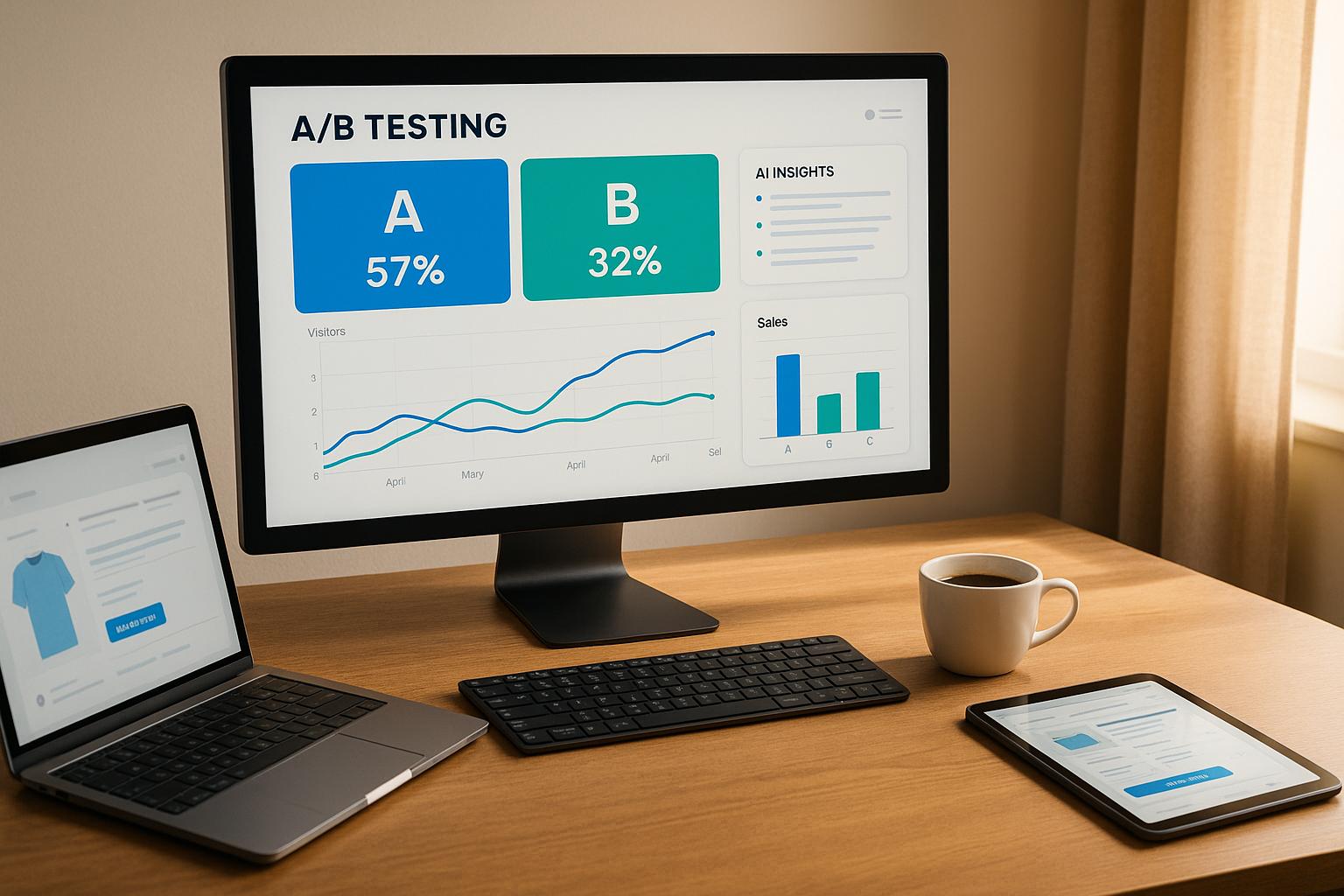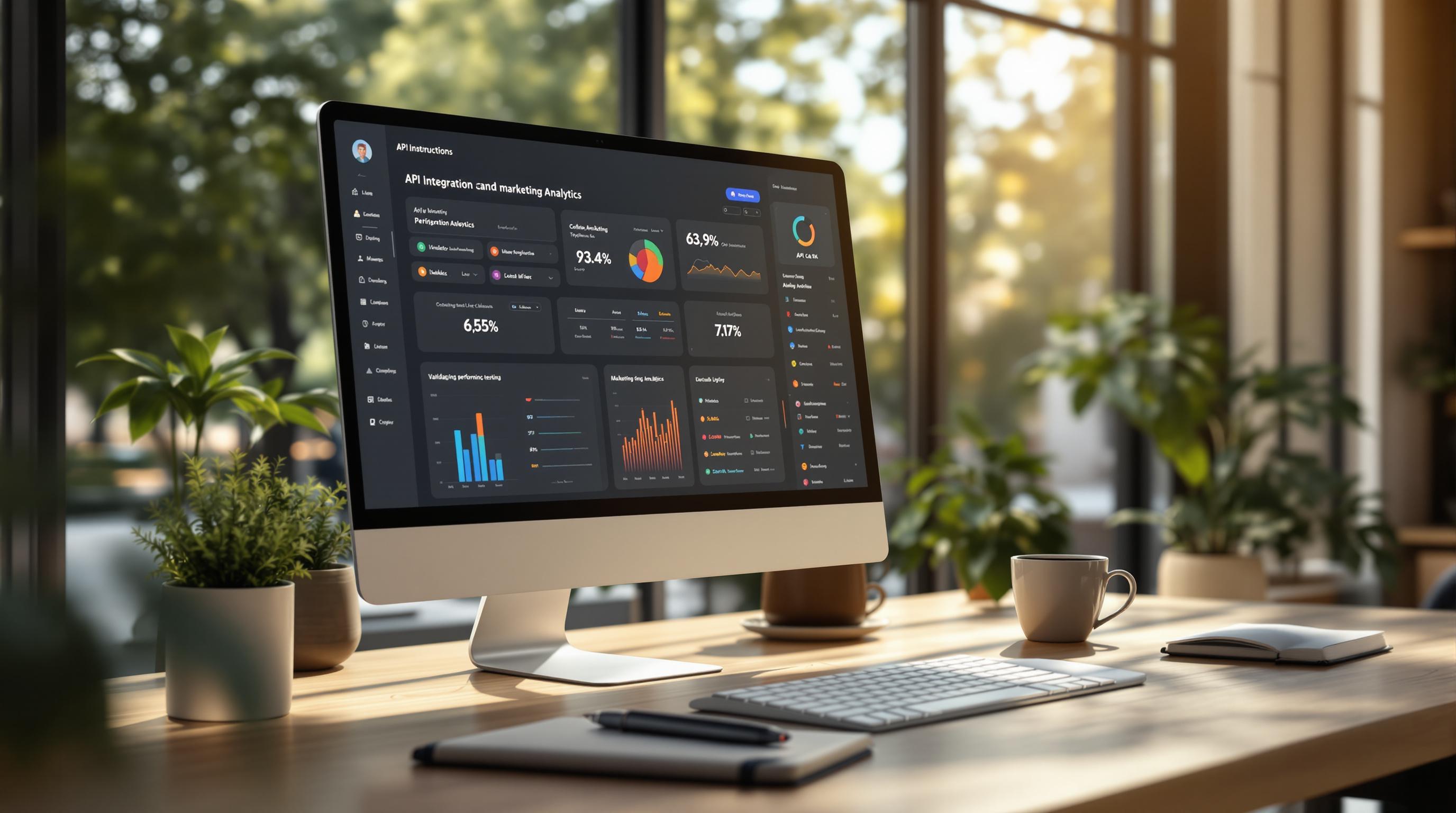Finding the perfect audience segmentation tool can transform your marketing strategy in 2024.
Maximize Your ROI: 5 Audience Segments to Target in 2024
Value Summary:
This article breaks down the 7 best audience segmentation tools to help you target the right customers with precision. Whether you're focused on AI-powered insights, real-time data, or seamless integrations, this guide covers tools for businesses of all sizes.
Quick Overview:
- Meltwater: AI-driven insights for audience behavior and trends.
- Google Analytics: Web and app data segmentation with real-time tracking.
- ActiveCampaign: Automation and CRM for personalized campaigns.
- Twilio Segment: Real-time customer data updates across platforms.
- Cognism: B2B segmentation with enriched lead data.
- QuestionPro: Survey-based segmentation for customer feedback.
- Mailchimp: Email marketing with dynamic audience groups.
Quick Comparison Table:
| Tool | Best For | Starting Price | Key Feature |
|---|---|---|---|
| Meltwater | Consumer insights | Custom Quote | AI-powered segmentation |
| Google Analytics | Web analytics | Free | Real-time tracking |
| ActiveCampaign | Marketing automation | $29/month | Automated audience updates |
| Twilio Segment | Data integration | $800/month | Predictive segmentation |
| Cognism | B2B sales | Custom Quote | Lead scoring and firmographics |
| QuestionPro | Surveys | $99/month | Advanced feedback segmentation |
| Mailchimp | Email campaigns | Free (basic plan) | Behavioral segmentation for emails |
Bridge:
Let’s dive into each tool’s features, pricing, and ideal use cases to help you choose the best fit for your business.
Features to Consider in Audience Segmentation Tools
When choosing audience segmentation tools for your business in 2024, it's important to focus on features that will help you achieve precise and actionable insights. Here’s what to look for:
Diverse Segmentation Methods
The best tools allow you to segment your audience in multiple ways, giving you a well-rounded view of customer behavior. This flexibility helps you design targeted campaigns based on detailed audience data [3].
Real-Time Data Analysis
Real-time analytics are a must for staying ahead in today’s fast-paced market. Tools that process and analyze data instantly let you respond quickly to shifts in customer behavior and market trends. For instance, Twilio Segment updates customer data across channels in real time [3].
Seamless Integration
Your segmentation tool should work smoothly with your existing marketing platforms and data sources. Integration ensures all your audience data is connected, helping you create a unified view across channels. This is especially useful for businesses juggling multiple tools and platforms.
AI and Advanced Analytics
Artificial intelligence and advanced analytics can uncover patterns in audience behavior that might otherwise go unnoticed. In fact, 71% of marketers report that data-driven segmentation improves campaign performance [5]. Meltwater, for example, combines AI with human expertise to deliver highly accurate segmentation results [3].
Here’s a quick breakdown of key features to evaluate:
| Feature Category | Must-Have Capabilities | Business Impact |
|---|---|---|
| Data Processing | Real-time analysis | Faster, actionable insights |
| Integration | Compatibility with other tools | Unified audience understanding |
| Analytics | AI-powered insights | More precise targeting |
| Customization | Flexible segmentation options | Tailored campaigns |
| Reporting | Detailed analytics | Smarter decision-making |
Scalability and Cost
Pick a tool that fits your current budget but also offers the flexibility to grow with your business. This ensures you’re not locked into a solution that can’t handle future needs.
Ease of Use
A user-friendly interface is key. Your team should be able to create and manage audience segments without needing advanced technical skills or lengthy training sessions.
1. Meltwater
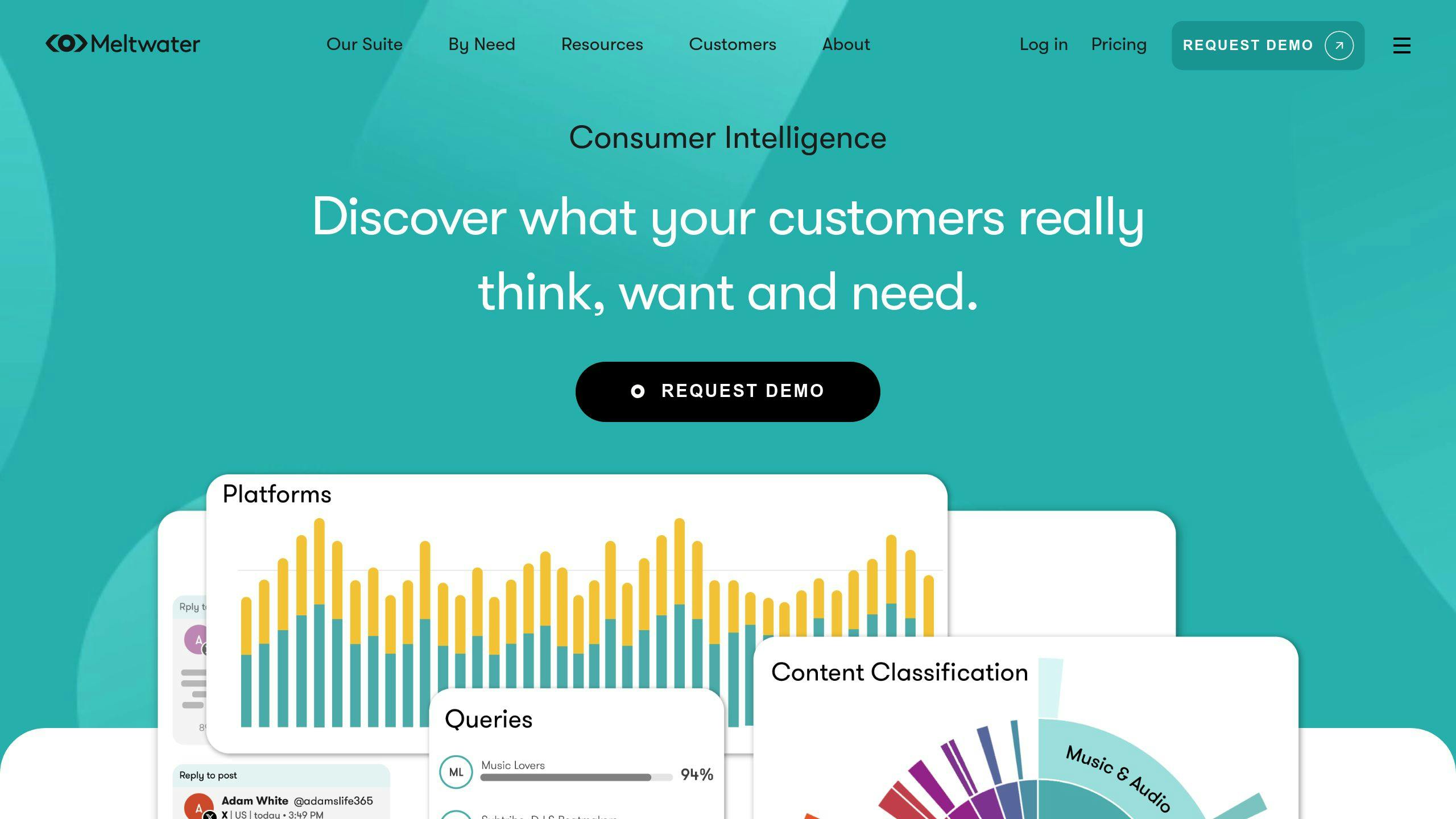
In 2024, as businesses focus on real-time decision-making and AI-driven insights, Meltwater stands out as a tool for precise audience segmentation.
Segmentation Capabilities
Meltwater enables audience segmentation using several key criteria:
| Segmentation Type | Details |
|---|---|
| Demographics | Age, gender, income, education levels |
| Behavioral | Shopping habits, brand interactions |
| Psychographic | Values, interests, lifestyle |
| Geographic | Location-based targeting |
Key Features
Meltwater combines AI with human analysis to deliver detailed audience insights. The platform tracks trends, shifts in audience sentiment, and market opportunities in real time. This allows businesses to adjust campaigns instantly based on live feedback.
Integration & Accessibility
Meltwater works smoothly with other marketing tools and data sources, offering a unified view of audiences across channels. Flexible pricing options are available, and the platform ensures an easy onboarding process with strong support.
"Meltwater shines a light on customer behaviors and interests, giving you myriad ways to connect with them." - Meltwater Blog [1]
By blending AI-driven insights with human expertise, Meltwater provides accurate segmentation that helps businesses craft targeted marketing strategies.
While Meltwater offers in-depth, multi-layered segmentation, Google Analytics takes a different approach, focusing more on web and app data insights.
2. Google Analytics

Google Analytics stands out as a go-to tool for digital marketers, offering detailed web analytics and advanced segmentation features. While Meltwater focuses on AI-driven social insights, Google Analytics delivers the data needed to understand and optimize website performance.
Segmentation Capabilities
Google Analytics allows you to break down your audience using a variety of criteria:
| Segmentation Criteria | Examples |
|---|---|
| Demographics | Age, gender, location |
| Behavior | Session duration, bounce rates, pages viewed |
| Custom Events | Purchases, downloads |
| Geographic | Country, region, city |
These options let you analyze user behavior and preferences, helping you tailor your strategies more effectively.
Real-time Data and Insights
One of its standout features is real-time data tracking. You can monitor user behavior as it happens, making it easier to tweak campaigns on the fly. This level of responsiveness helps businesses fine-tune their messaging and connect with their audience more effectively, leading to better campaign performance and improved ROI.
Integration Capabilities
Google Analytics works seamlessly with other Google tools like Google Ads and Tag Manager. It also supports integration with third-party platforms through APIs, making it a versatile choice for businesses looking to centralize their data.
Pricing and Accessibility
There’s a free version available, ideal for small businesses. For larger enterprises, the Google Analytics 360 plan starts at $50,000 per year. This premium option includes advanced features and dedicated support [4].
The User ID feature is another highlight, allowing businesses to track users across multiple devices. This enables precise audience segmentation and the creation of highly personalized campaigns. With these tools, Google Analytics becomes an essential resource for businesses aiming to gain actionable insights into their audience.
Next, we'll dive into how ActiveCampaign uses email marketing automation and CRM to elevate audience segmentation.
sbb-itb-5174ba0
3. ActiveCampaign
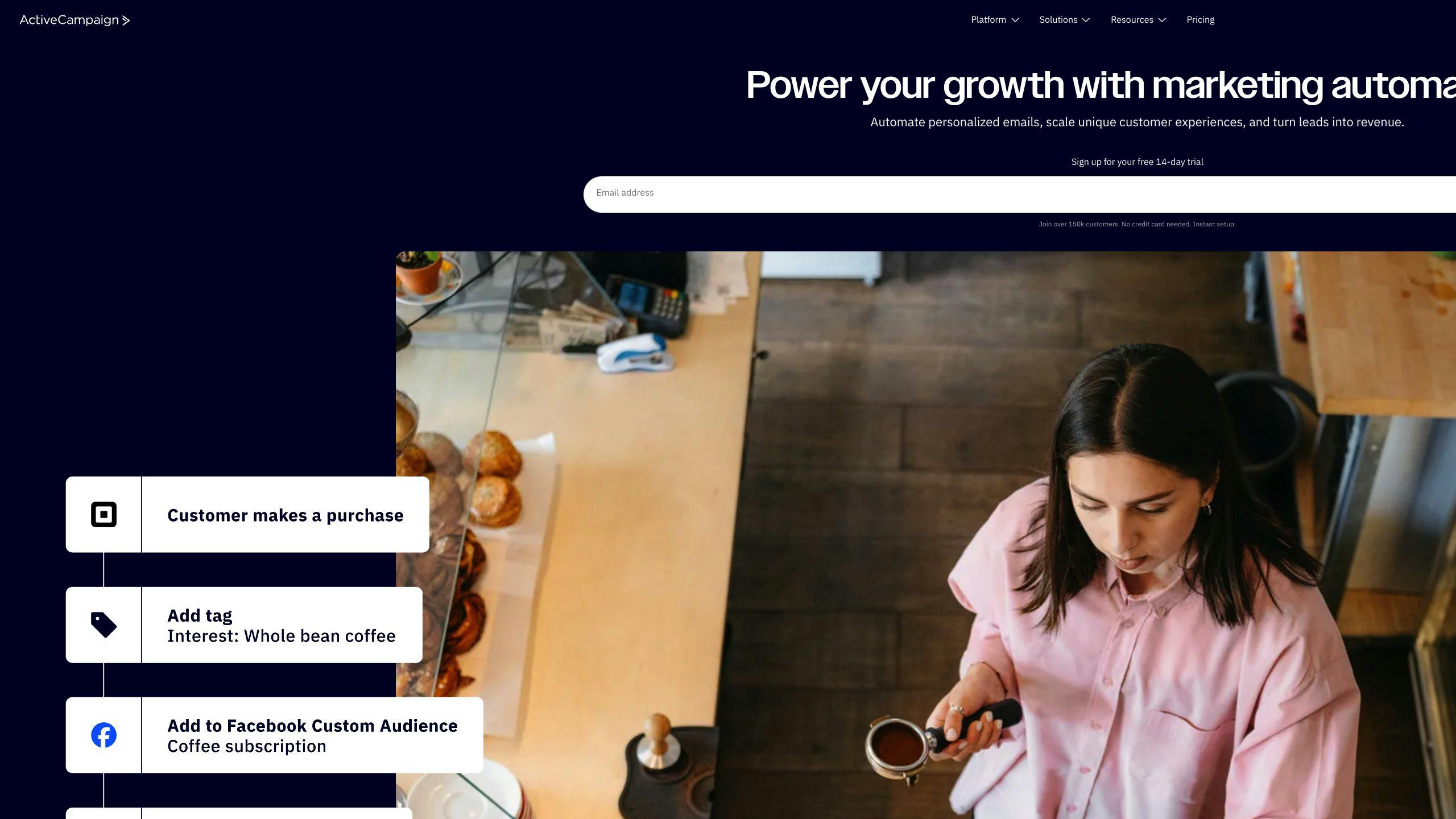
ActiveCampaign is a marketing automation platform used by over 180,000 customers in 170 countries [1]. It specializes in advanced audience segmentation, making it easier for businesses to scale personalized marketing efforts.
Segmentation and Automation
ActiveCampaign stands out for its ability to create detailed audience segments using a variety of data sources:
- Behavioral data: Includes purchase history, website activity, and email engagement.
- Contact attributes: Covers demographics, custom fields, and tags.
- Dynamic conditions: Tracks actions like email opens or form submissions.
- Automated rules: Triggers personalized content based on user behavior.
The platform’s automation capabilities take segmentation to the next level. It dynamically updates audience groups and activates relevant marketing actions in response to real-time user interactions.
Key Features and Integration
ActiveCampaign offers real-time analytics to power automated workflows, ensuring immediate responses to customer behavior. It also integrates with a wide range of business tools, including:
- CRM systems
- E-commerce platforms
- Social media tools
These integrations allow businesses to pull data from multiple sources, creating a unified view of customer interactions and enhancing segmentation accuracy.
Pricing Overview
Plans start at $9/month for basic email marketing, with advanced segmentation and automation features available in higher-tier plans. Enterprise-level options include custom pricing and solutions tailored to larger operations.
"ActiveCampaign's automation feature allows users to automate the process of segmenting and targeting specific audience groups, saving time and increasing efficiency. This enables marketers to focus on more strategic tasks and to scale their marketing efforts more effectively."
With a 4.6/5 rating on G2 from over 10,000 reviews [6], ActiveCampaign has proven its ability to meet diverse business needs. Its 24/7 support ensures users can quickly implement and fine-tune their strategies.
While ActiveCampaign excels in automating segmentation and personalization, Twilio Segment focuses more on consolidating customer data across platforms to deliver deeper insights.
4. Twilio Segment
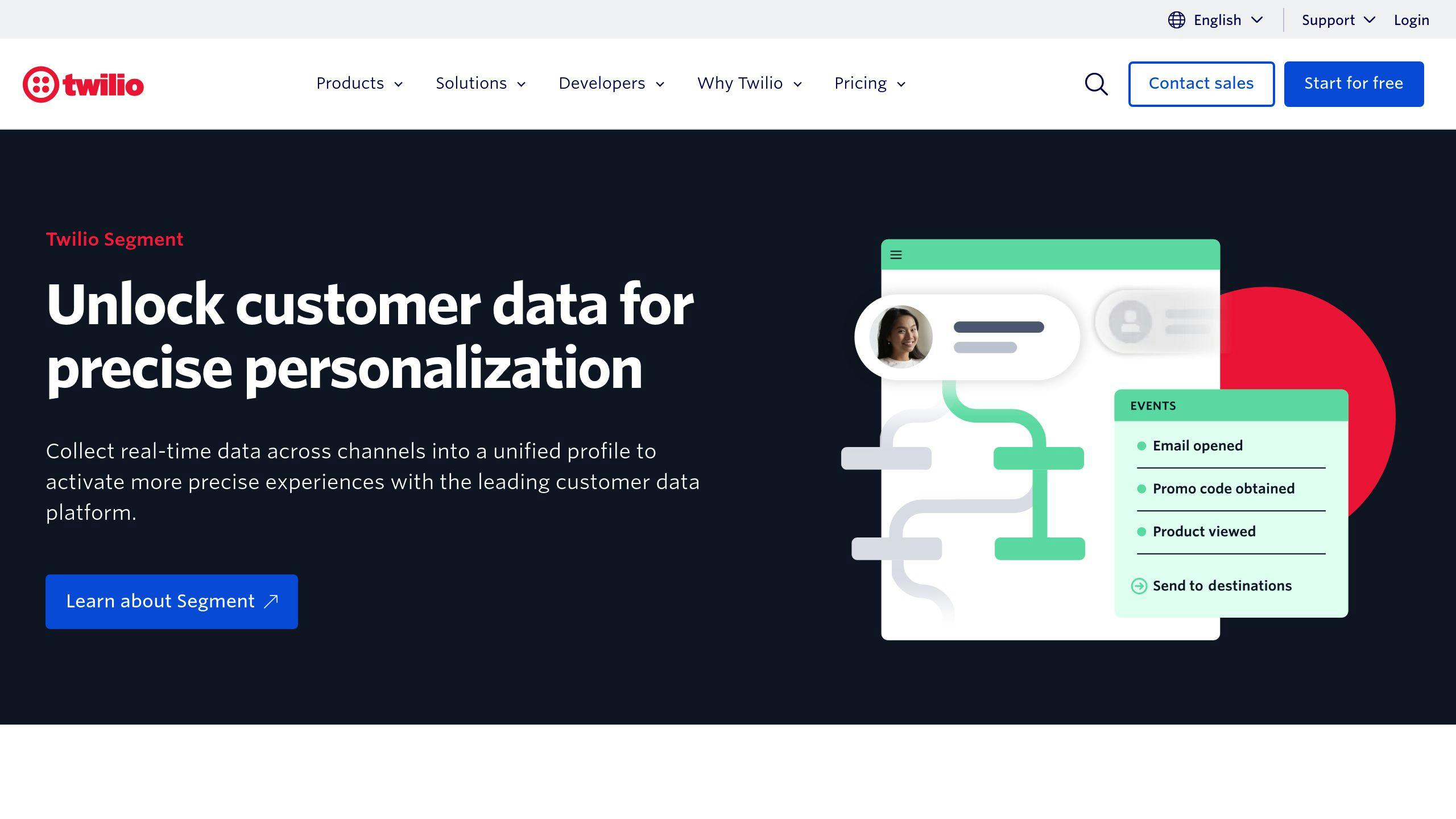
Twilio Segment is a customer data platform designed to bring together customer data from various channels. It updates customer profiles in real-time, allowing businesses to tweak campaigns instantly based on user behavior.
Key Features
Twilio Segment stands out for its thorough data management and segmentation capabilities:
- Predictive Segmentation: Uses AI to predict customer behavior and pinpoint high-value prospects by analyzing past trends.
- Real-Time Updates: Continuously refreshes customer profiles, enabling on-the-spot campaign adjustments.
- Integrated Data Management: Works seamlessly with more than 300 tools, creating a single, streamlined view of customer data and simplifying workflows.
Advanced Segmentation Tools
The platform supports a variety of segmentation methods:
- Behavior Tracking: Monitors user actions across different channels.
- AI Insights: Detects trends and forecasts customer behavior.
- Custom Grouping: Allows businesses to create tailored audience segments based on their unique needs.
Pricing
Twilio Segment provides options for businesses of all sizes: a free plan for basic requirements, a Team plan starting at $120 per month, and enterprise-level pricing tailored for larger organizations.
While Twilio Segment excels at combining data and offering predictive analytics, Cognism focuses more on delivering specific audience insights for B2B marketers.
5. Cognism
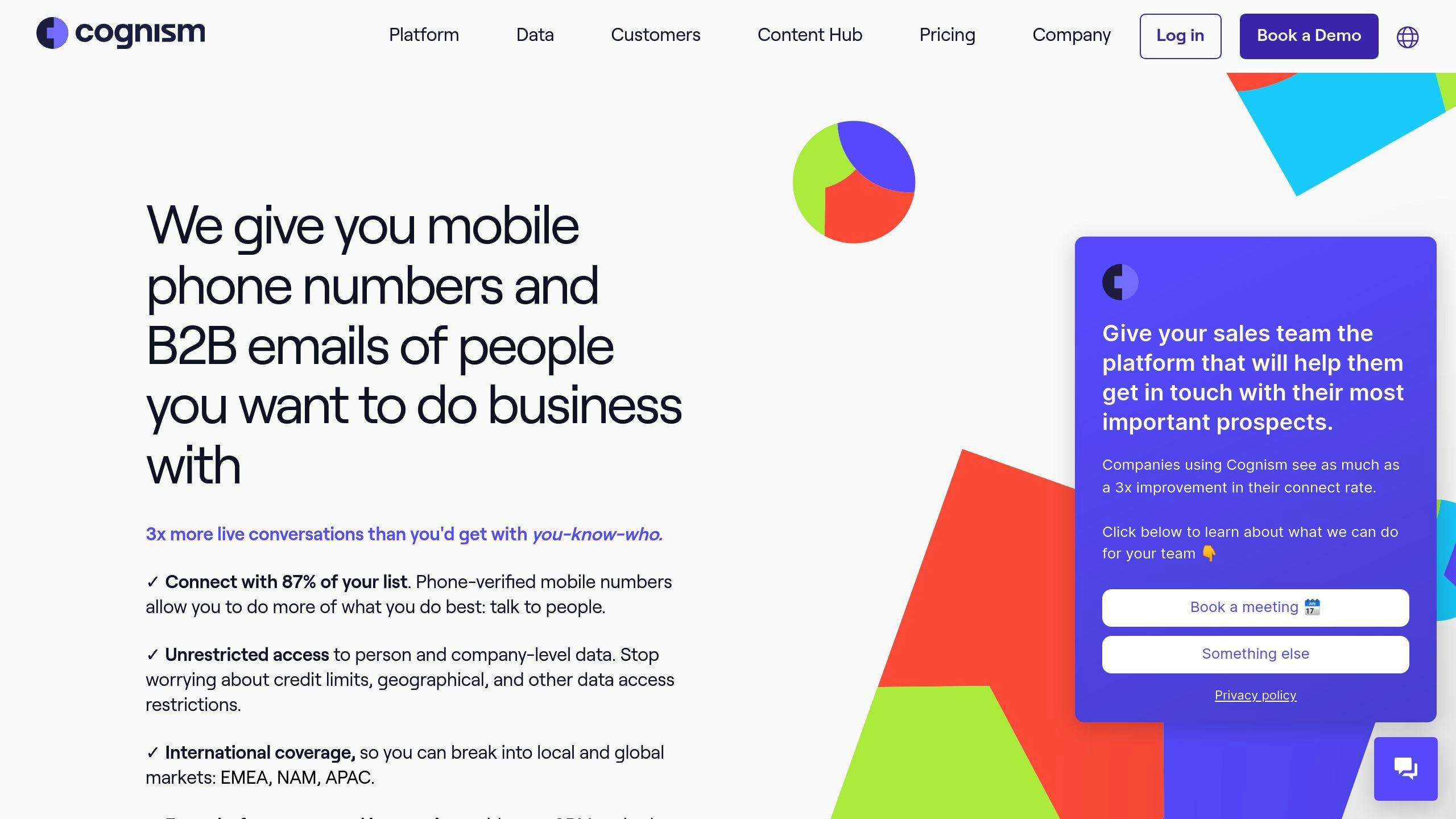
Cognism is a B2B sales intelligence platform designed to help businesses target the right audience with precision. By focusing on enriching B2B data and delivering actionable insights, it stands out from general-purpose tools.
Segmentation Capabilities
Cognism allows marketers to create detailed audience segments using factors like demographics, location, technographics, and custom criteria. Its AI-driven algorithms continuously update customer data, ensuring accuracy even in fast-changing markets.
Real-time Data Analysis and Insights
Cognism provides real-time features that offer immediate benefits:
| Feature | What It Does |
|---|---|
| Live Data Updates | Keeps customer profiles current |
| Behavioral Tracking | Monitors engagement across multiple touchpoints |
| Lead Scoring | Automatically prioritizes prospects |
| Custom Analytics | Generates tailored reports for specific segments |
Integration Capabilities
Cognism works seamlessly with CRMs, marketing automation tools, sales platforms, and email systems. This smooth integration ensures data flows effortlessly, helping businesses maintain consistent messaging and run coordinated campaigns.
Pricing and Accessibility
Cognism offers flexible pricing options to suit businesses of all sizes. A free trial is available, making it easy to evaluate the platform before committing. Plans range from basic packages to more comprehensive solutions for larger enterprises.
While Cognism is a strong choice for B2B sales intelligence, platforms like QuestionPro specialize in segmentation for customer feedback and surveys.
6. QuestionPro
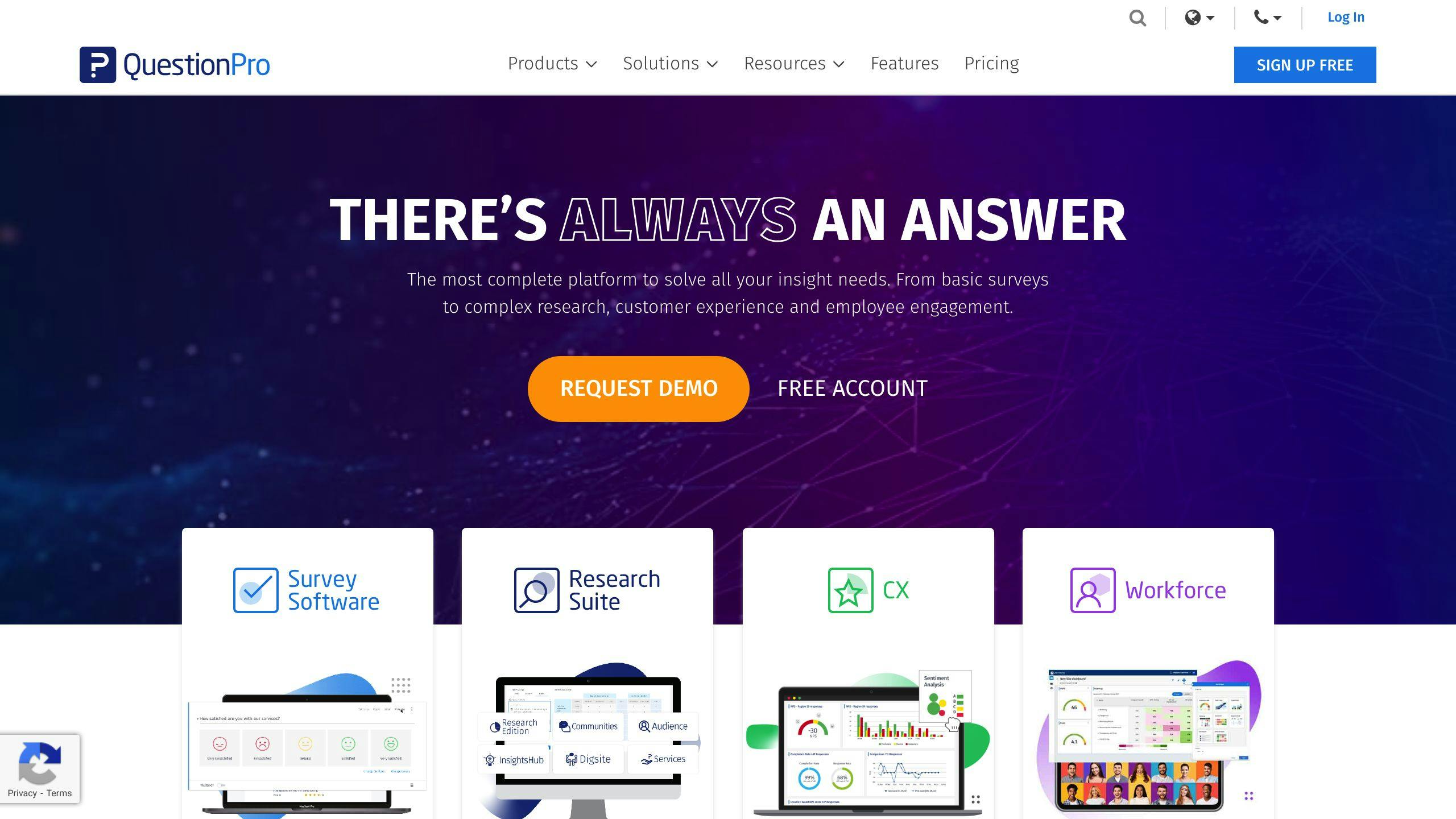
QuestionPro is a survey platform that combines powerful survey tools with advanced audience segmentation options, making it a great choice for businesses looking to gain insights from their surveys.
Segmentation Features
QuestionPro offers audience segmentation based on various criteria:
| Segmentation Type | Details |
|---|---|
| Demographic | Factors like age, gender, income, and education |
| Behavioral | Insights from purchase patterns and survey responses |
| Geographic | Location-based targeting |
| Custom Criteria | User-defined segments tailored to specific needs |
Real-Time Analytics
With real-time analytics, QuestionPro helps businesses make informed decisions quickly. Its dynamic dashboards provide a clear view of survey results, segment performance, and trends within specific audience groups.
Integration Options
QuestionPro integrates seamlessly with various tools to enhance its functionality:
| Integration Type | Features |
|---|---|
| CRM Systems | Sync customer profiles and manage data effectively |
| Email Marketing | Automate campaigns and track responses |
| Social Media | Monitor engagement across different platforms |
| Analytics | Generate detailed reports and visualizations |
Pricing and Security
QuestionPro offers pricing plans suitable for businesses of all sizes, including options for custom enterprise solutions. All plans include GDPR-compliant data protection, ensuring secure data handling for businesses in regulated industries.
While QuestionPro specializes in gathering insights through surveys and feedback, platforms like Mailchimp are better suited for email marketing and audience engagement strategies.
7. Mailchimp

Mailchimp is a well-known name in email marketing, offering tools like segmentation and automation to help businesses send tailored content that boosts engagement and sales. Its feature-packed platform is a go-to for creating targeted campaigns.
Segmentation and Analytics
Mailchimp excels in segmentation, focusing on specific campaign criteria:
| Segmentation Focus | Capabilities |
|---|---|
| Campaign Engagement | Tracks open rates, click-throughs, and conversions |
| Custom Tags | Includes user preferences, interest groups, and personalized details |
| Automated Updates | Dynamically adjusts segments based on user behavior |
Its analytics dashboard offers insights into:
- Email performance
- Audience growth
- Revenue generated from campaigns
- Patterns in user engagement
Integration and Automation
Mailchimp integrates smoothly with tools like Shopify, Salesforce, and Google Analytics, making it easy to manage everything from one place. Its automation features work hand-in-hand with segmentation, delivering campaigns tailored to user actions and preferences.
Pricing Structure
Mailchimp provides several pricing options:
- Free Plan: Includes basic segmentation for up to 2,000 contacts
- Essentials: Starts at $13/month and offers advanced segmentation
- Standard: Adds more automation features
- Premium: Designed for enterprise needs
With a 4.5/5 rating from over 10,000 reviews on G2 [6], Mailchimp continues to be a trusted choice. In fact, 61% of marketers say segmentation is key to their email marketing success [2], underscoring Mailchimp's relevance.
"Mailchimp's segmentation capabilities enable businesses to create highly targeted campaigns by dividing their audience based on specific attributes such as age, location, purchase history, and engagement levels."
Mailchimp’s powerful tools make it a standout in email marketing and audience segmentation. Up next, we’ll compare these tools side by side to help you find the best match for your needs.
Tool Comparison Table
Here's a quick look at the top audience segmentation tools of 2024 to help you decide which one fits your business needs:
| Feature | Meltwater | Google Analytics | ActiveCampaign | Twilio Segment | Cognism | QuestionPro | Mailchimp |
|---|---|---|---|---|---|---|---|
| Primary Use Case | Consumer Intelligence | Web Analytics | Marketing Automation | Data Integration | B2B Sales | Survey Analytics | Email Marketing |
| Segmentation Types | Demographic, Behavioral, Psychographic | Behavioral, Geographic | Demographic, Behavioral, Custom | Cross-channel, Behavioral | B2B, Firmographic | Survey-based, Custom | Demographic, Behavioral |
| Real-time Analysis | Yes | Yes | Limited | Yes | Yes | Yes | Limited |
| Starting Price | Custom Quote | Free | $29/month | $800/month | Custom Quote | $99/month | Free (up to 2,000 contacts) |
| Best For | Enterprise | All Business Sizes | SMBs | Enterprise | B2B Sales | Market Research | SMBs & Startups |
| Key Integrations | CRM, Social Media | Google Ads, BigQuery | CRM, E-commerce | 300+ Tools | CRM, Sales Tools | Survey Tools | E-commerce, CRM |
What Sets Each Tool Apart?
Here’s a breakdown of what makes each tool unique, along with how well they scale for enterprise needs:
| Tool | Standout Features | Enterprise Scalability (Users, Data, Support) |
|---|---|---|
| Meltwater | AI-powered consumer insights, social listening | Unlimited users, unlimited data, 24/7 support |
| Google Analytics | Detailed web tracking, conversion optimization | Unlimited users, plan-based data, business hours support |
| ActiveCampaign | Marketing automation, predictive sending | Varies by plan, varies by plan, priority support |
| Twilio Segment | Real-time campaign optimization, customer data platform (CDP) | Unlimited users, custom data, 24/7 priority support |
| Cognism | B2B prospecting, compliance tools | Varies by plan, varies by plan, priority support |
| QuestionPro | Advanced survey creation, multi-channel distribution | Varies by plan, varies by plan, priority support |
| Mailchimp | Email automation, e-commerce integrations | Varies by plan, varies by plan, priority support |
"The key to successful audience segmentation lies in choosing a tool that not only meets your current needs but can scale with your business growth while providing actionable insights for your marketing strategies."
The right tool depends on your specific goals, budget, and future scalability. Use this comparison to align features with your business objectives - this will simplify your decision-making process.
Conclusion
Choosing the right audience segmentation tool is essential for businesses looking to fine-tune their marketing strategies in 2024. Each tool brings its own set of features, catering to various business needs and objectives.
With a wide range of options - from free tools to enterprise-grade platforms - businesses of all sizes can find a solution that fits both their budgets and requirements. Striking the right balance between cost and functionality is key.
It's important to pick a tool that aligns with your specific goals. For instance, B2B companies focused on account-based marketing might benefit from Cognism's firmographic segmentation, while e-commerce businesses could gain more from Mailchimp's behavioral segmentation for email campaigns.
"The key to successful audience segmentation lies in choosing a tool that not only meets your current needs but can scale with your business growth while providing actionable insights for your marketing strategies."
To get the most out of your segmentation efforts, look for a solution that fits your goals, integrates smoothly with existing systems, and can grow alongside your company. For detailed comparisons and user feedback on these tools, check out the Marketing Analytics Tools Directory.
Finally, keep your segmentation criteria up-to-date and ensure your tools align with your evolving strategy. With advancements in AI expected to improve accuracy and insights in 2024, staying ahead of these changes will be crucial for maximizing ROI.
FAQs
What is the best segmentation tool?
The ideal audience segmentation tool depends on what your business needs. Each tool has its strengths: Cognism is great for B2B segmentation, QuestionPro excels in survey analytics, and Google Analytics dominates in website tracking. If you're looking for AI-driven audience insights, Meltwater is a strong contender.
Key factors to consider include:
- Business size: Smaller businesses might prefer tools like Mailchimp, while larger enterprises often turn to platforms like Twilio Segment.
- Budget: There are free options available, but enterprise solutions can start at $800/month.
- Integration: Look for tools that work well with your current technology stack.
For a deeper dive into these tools and their features, check out the Marketing Analytics Tools Directory or the "Features to Consider" section.
"Choosing the right tool requires balancing your current needs with future scalability and ensuring it integrates seamlessly with your tech stack."
Ultimately, the tool you choose should match your marketing goals and be flexible enough to grow with your business.

